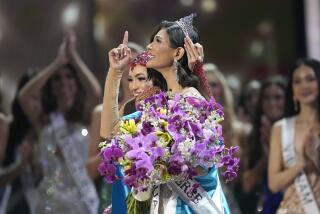Nicaragua withdraws from UNESCO in protest of press freedom award

- Share via
PARIS — UNESCO on Sunday announced the withdrawal of Nicaragua from the U.N. cultural and educational body because of the awarding of its prize celebrating press freedom to a Nicaraguan newspaper.
Nicaragua announced its withdrawal from the U.N. Educational, Scientific and Cultural Organization in a letter that UNESCO Director-General Audrey Azoulay said she received Sunday morning.
In the letter, seen by the Associated Press, Nicaraguan Foreign Minister Valdrack Jaentschke denounced the awarding of a UNESCO press freedom prize to La Prensa. The prize jury hailed the newspaper’s work in the face of “severe repression” and reporting from exile that “courageously keeps the flame of press freedom alive” in the Central American country.
Nicaragua’s government, led by President Daniel Ortega and his wife and co-president, Rosario Murillo, has been cracking down on dissent since it violently repressed protests in 2018, claiming the rallies were backed by foreign powers that sought his overthrow.
In his letter to UNESCO, Jaentschke claimed La Prensa is a pro-U.S. news outlet and “represents the vile betrayal against our Motherland.”
Nicaragua was one of 194 member states in the United Nations agency, which promotes education, science and culture and works for the preservation of outstanding cultural and natural heritage around the world. Its departure comes at a time UNESCO is also in President Trump’s crosshairs.
Here’s a look at the dispute:
UNESCO’s Guillermo Cano Prize
UNESCO member states created the World Press Freedom Prize in 1997. The only U.N. prize awarded to journalists, it is named after Colombian newspaper journalist Guillermo Cano Isaza, who was assassinated in Bogota, the capital, in 1986.
An international jury of media professionals that recommended La Prensa for the 2025 award on Saturday said through its chairman that the newspaper, founded in 1926, “has made courageous efforts to report the truth to the people of Nicaragua.”
UNESCO said that “since 2021, following the imprisonment and expulsion of its leaders from the country as well as the confiscation of its assets, La Prensa has continued to inform the Nicaraguan population online, with most of its team in exile and operating from Costa Rica, Spain, Mexico, Germany and the United States.”
Other recent laureates include Belarus’ top independent journalists’ organization, recognized in 2022, and, in 2019, journalists Kyaw Soe Oo and Wa Lone, who were jailed in Myanmar for their reporting on the military’s brutal crackdown on Rohingya Muslims.
Nicaragua’s reaction
Jaentschke’s letter said that UNESCO recognition for La Prensa was “undeserved” and that the agency’s actions were “unacceptable and inadmissible.”
The minister alleged, without offering evidence, that La Prensa has promoted U.S. military and political intervention in Nicaragua.
“It is deeply shameful that UNESCO appears as the promoter, and obviously as an accomplice, of an action that offends and attacks the deepest Values of Nicaragua’s National Identity and Culture,” his signed and stamped letter said.
Nicaragua’s government later issued a statement that echoed Jaentschke’s claims.
“When UNESCO gives prominence to the traitors, slaves and lackeys of colonialism and imperialism, it totally abandons any sense of objectivity,” it said.
UNESCO’s reply
In a statement announcing Nicaragua’s decision to leave, Azoulay said that “UNESCO is fully within its mandate when it defends freedom of expression and press freedom around the world.”
“I regret this decision, which will deprive the people of Nicaragua of the benefits of cooperation, particularly in the fields of education and culture,” she said.
Trump’s UNESCO review
In his first term, Trump looked dimly on Ortega’s rule. In 2018, Trump signed into law a bill to cut off resources to the government of Nicaragua. But he has also been critical of UNESCO.
In an executive order in February, Trump called for a review of U.S. involvement in the agency. His previous administration in 2017 announced that the U.S. would withdraw from UNESCO, citing anti-Israel bias. That decision took effect a year later.
The United States formally rejoined UNESCO in 2023 after a five-year absence, under the Biden administration.
More to Read
Sign up for Essential California
The most important California stories and recommendations in your inbox every morning.
You may occasionally receive promotional content from the Los Angeles Times.









